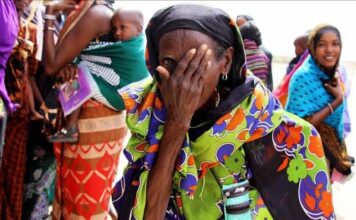New concerns have emerged regarding the imminent threat of hunger, as the World Food Price has forecasted that 31.8 million Nigerians (which is 16 percent of the population studied) are expected to confront crisis or more severe levels of acute food insecurity between June and August 2024.
This information was detailed in the most recent projection from WFP for June to October 2024, which was released on its X platform. As per the report, close to 1 million individuals in the country are anticipated to be in a state of emergency due to acute food insecurity.
The WFP has classified food insecurity into five stages on a scale ranging from one to five, with phase 1 representing minimal food insecurity, phase 2 indicating stressed food insecurity, phase 3 denoting crisis food insecurity, phase 4 signifying emergency food insecurity, and phase 5 standing for catastrophic food insecurity.
The statement partly reads, “Between June and August 2024, 31.8 million people (16 per cent of the population analysed) are projected to face crisis or worse ( Phase 3 or above) levels of acute food insecurity, with nearly 1 million people projected to be in Emergency ( Phase 4).
This represents a 3 percentage point increase in the number of acutely food insecure people compared to the same time in the previous year. Acute malnutrition levels remain high, above 10 per cent, in the northern states (Borno, Yobe, Sokota, Katsina and Zamfara), with 4.4 million children and 585 000 pregnant and breastfeeding women projected to be acutely malnourished in 2024.”
The World Food Programme (WFP) expects food insecurity to persist at alarming levels, driven by a combination of factors including deteriorating economic conditions, increased insecurity, and reduced agricultural output in the northern regions of Nigeria, leading to a complex and prolonged crisis.
It noted, “The security situation is likely to continue to deteriorate, exacerbating population displacement. This is a particular concern for the northern states, which have already seen an uptick in insurgency, banditry and kidnapping in the first quarter of 2024.
“Insecurity has been disrupting agricultural livelihoods and affecting the functionality of markets.321 Insecurity results in high humanitarian access constraints, particularly in the northeast, restricting the delivery of assistance to government-controlled towns and their immediate surroundings.
“This is a particular concern for the northern states, which have already seen an uptick in insurgency, banditry and kidnapping in the first quarter of 2024. The latter increased by 44 per cent in the first quarter of 2024 compared to the same period in 2023. Insecurity has been disrupting agricultural livelihoods and affecting the functionality of markets. Insecurity results in high humanitarian access constraints, particularly in the northeast, restricting the delivery of assistance to government-controlled towns and their immediate surroundings.”
According to the World Food Programme (WFP), Nigeria’s inflation rate surged to over 33% in March 2024, further weakening the already limited purchasing power of many households, exacerbating the struggles of the 38% of the population living below the poverty line.
It added, “On top of that, the naira has been strongly fluctuating, registering a yearly depreciation of 60 per cent in February 2024. Due to below-average cereal production in 2023 and high transport costs, prices of major staples such as rice and maize were 105 and 241 per cent higher, respectively, on a yearly basis, in February 2024.
“During the outlook, import restrictions amid abating foreign reserves, increasing farming costs, and high levels of conflict in the North East, North West and parts of the North Central zones will likely impact the 2024 agricultural season.”
The World Food Programme (WFP) also cautioned that the current situation will lead to decreased crop yields, resulting in even higher food prices and additional inflationary pressures, exacerbating the already dire food security situation in Nigeria.
